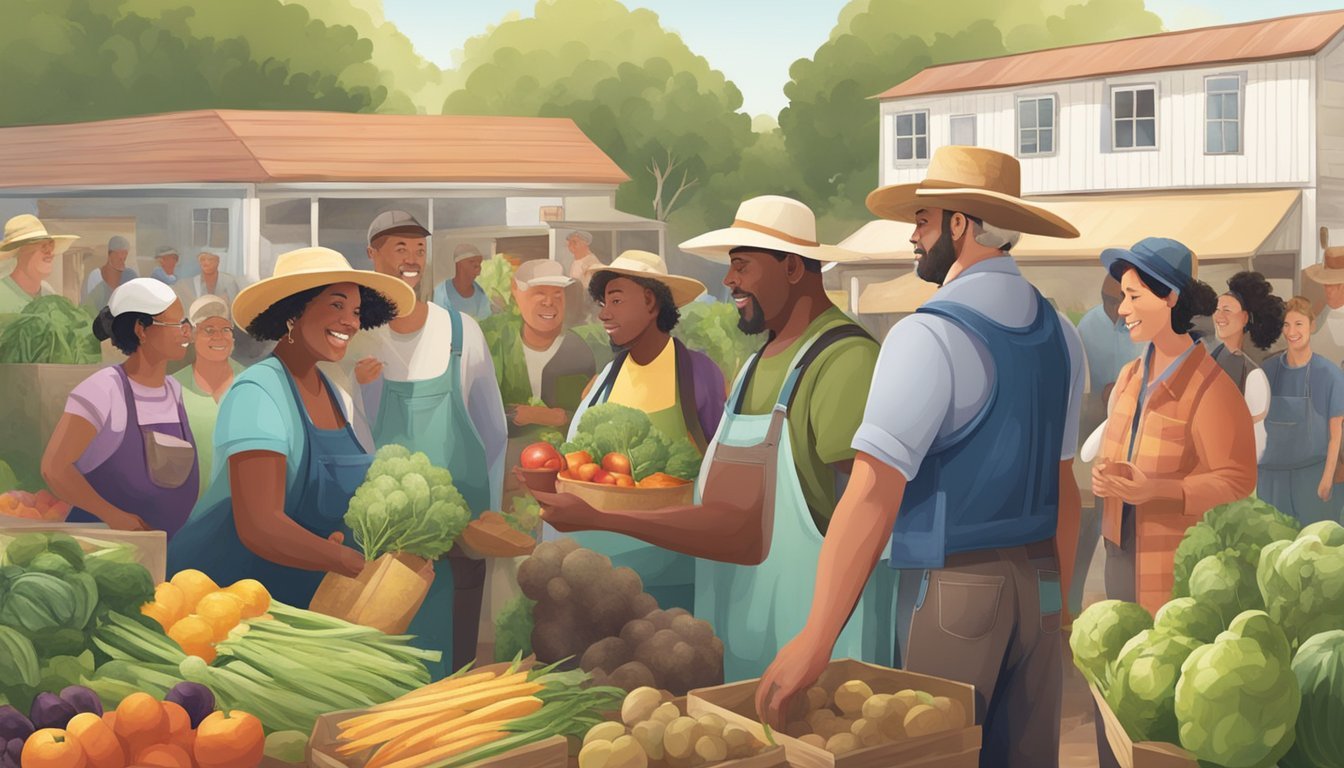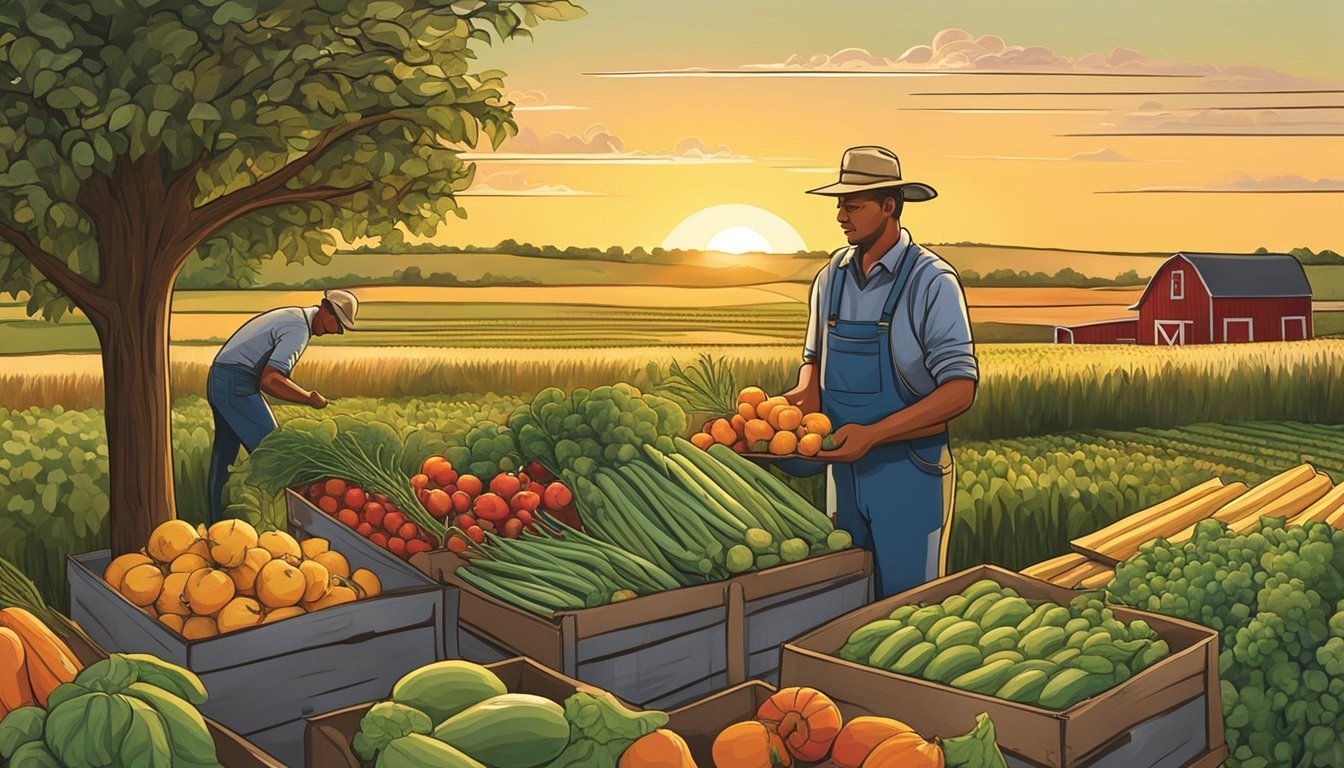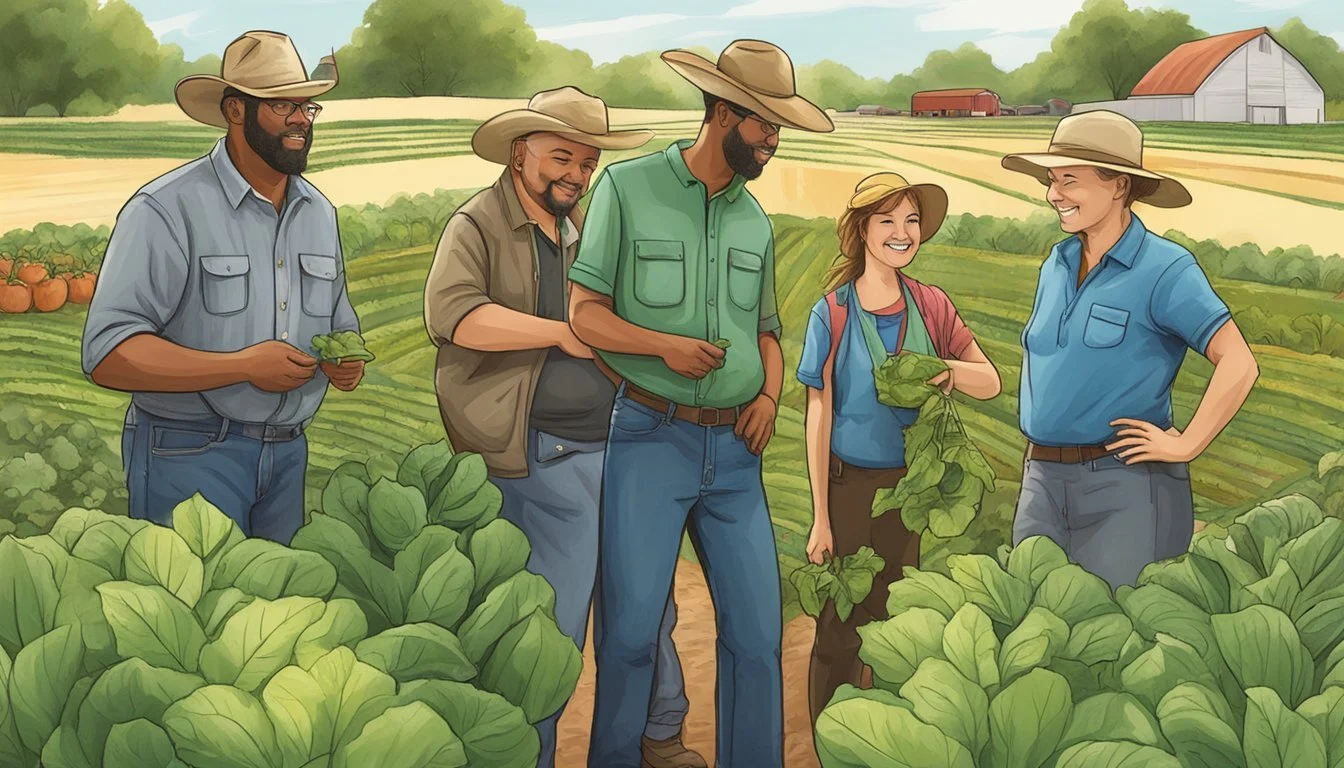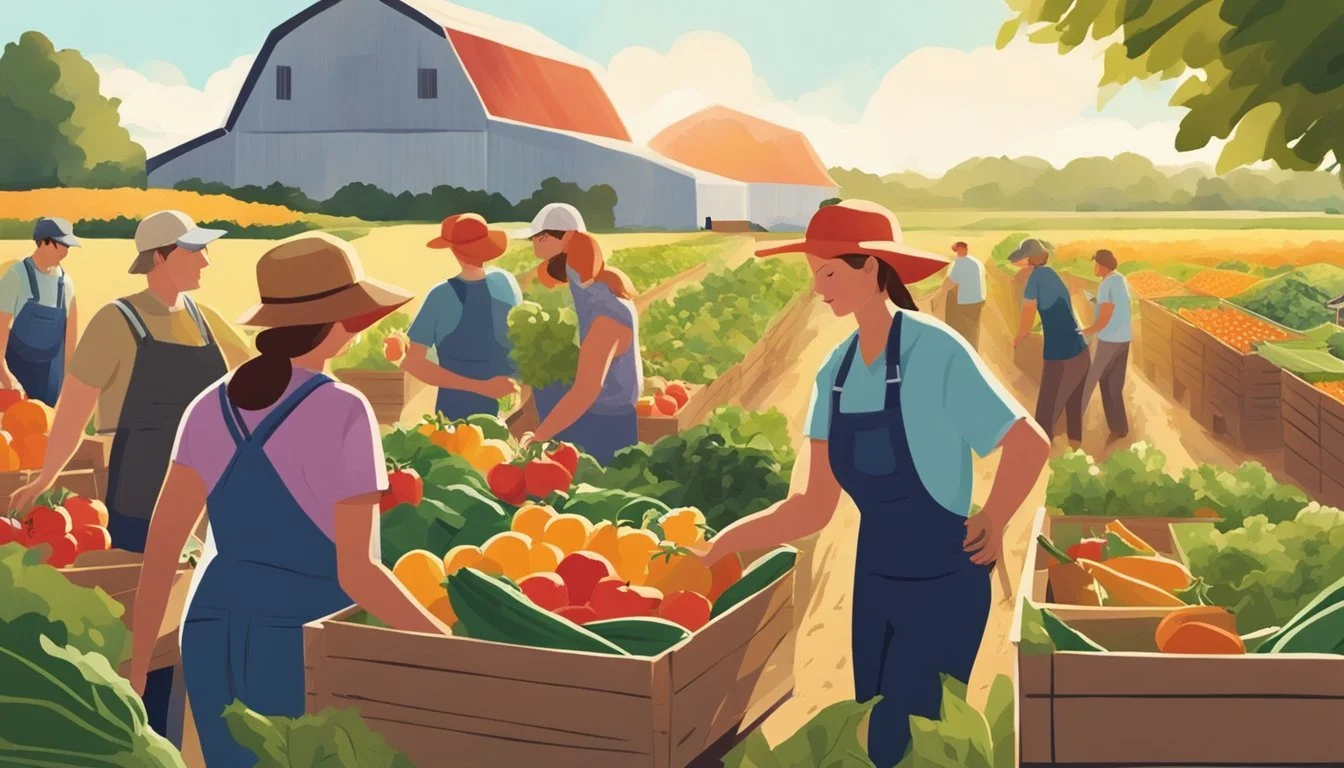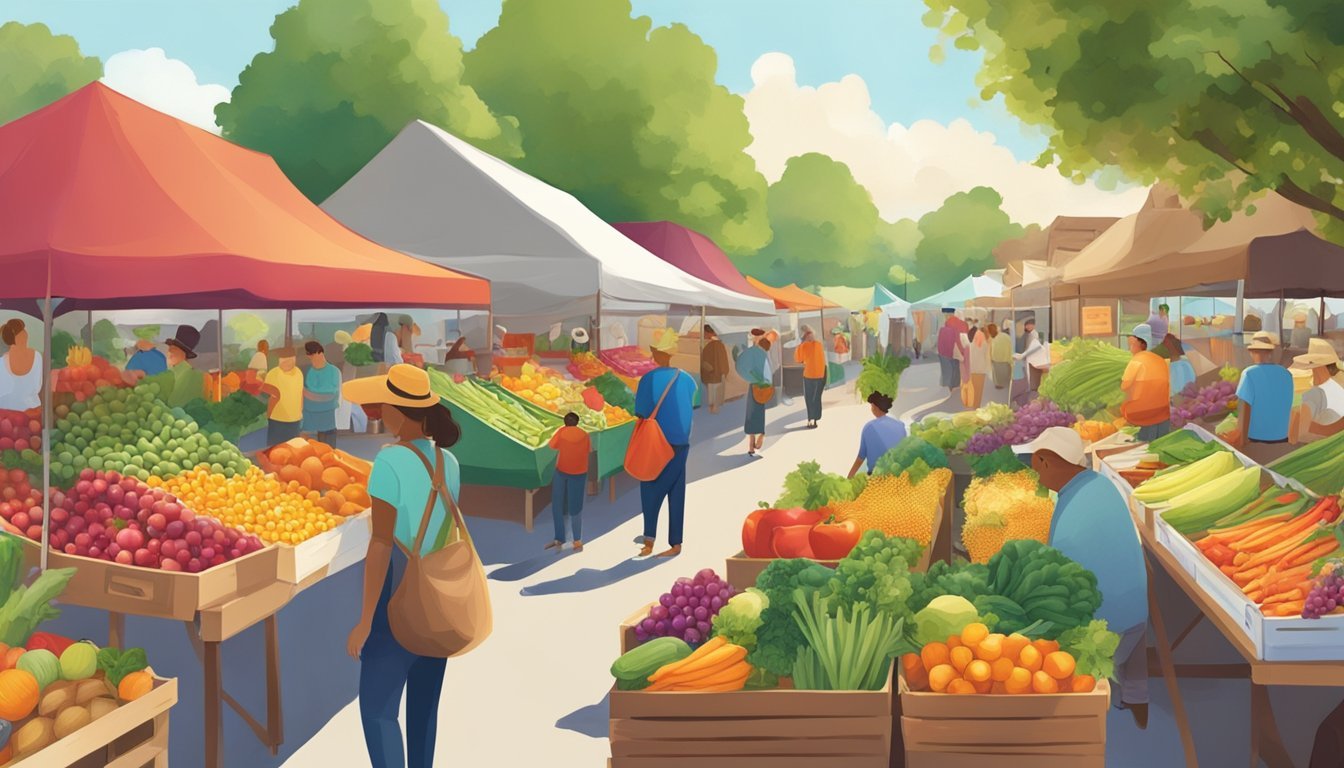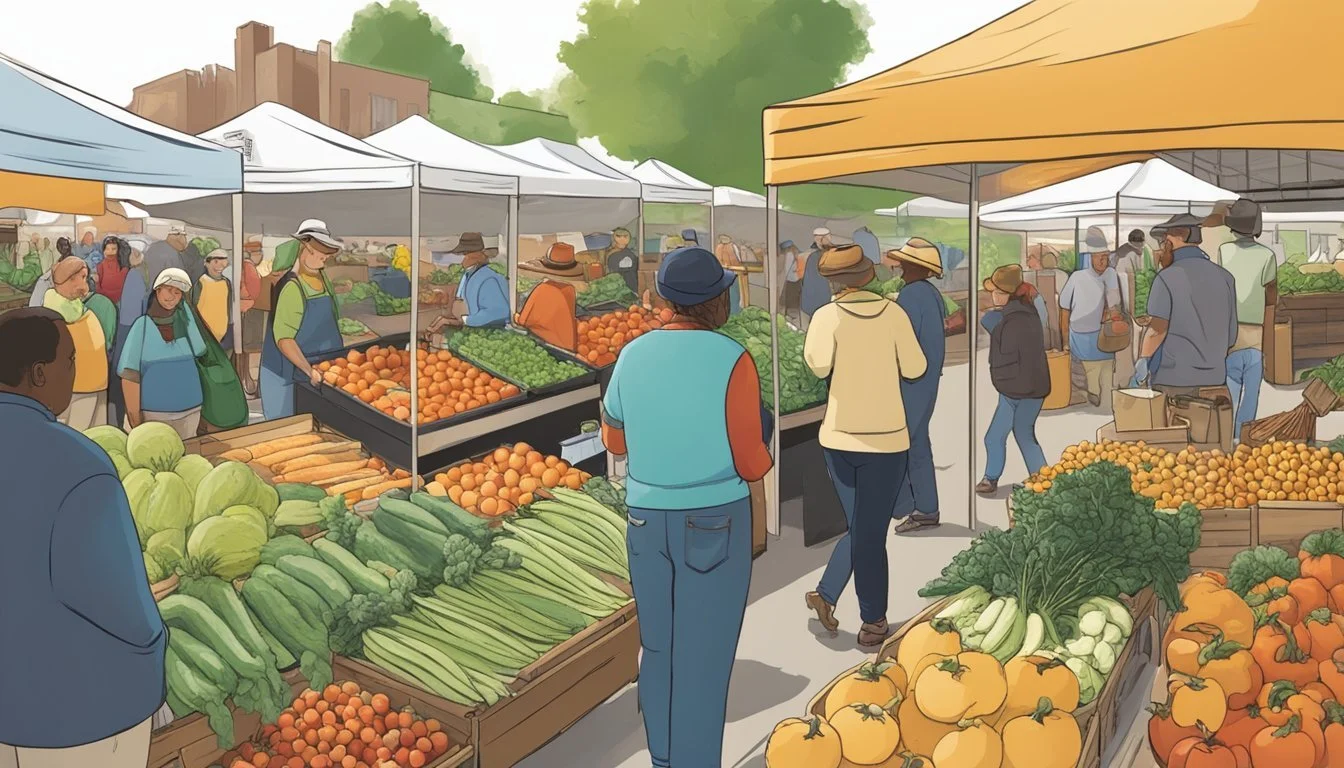Community Supported Agriculture (CSA) in Iowa
A Guide to Local Produce Partnerships
Community Supported Agriculture, or CSA, has become an increasingly popular model for local food distribution in Iowa, supporting both local economies and sustainable farming practices. In essence, CSA programs allow consumers to buy seasonal produce directly from local farmers. Iowa's rich agricultural roots make it an ideal place for CSAs to thrive, providing a wide array of produce to members who subscribe. Subscribers, often referred to as CSA members, pay for a share of the anticipated harvest upfront, which in turn gives the farmer working capital at the start of the growing season.
Integration of CSAs in Iowa’s agricultural landscape has bolstered a strong connection between farmers and consumers. Across the state, various CSA farms offer fresh, locally-grown fruits, vegetables, and other farm products like eggs and flowers, to their members throughout the farming season. This model of direct sales not only ensures customers receive the freshest produce possible but also offers a glimpse into the seasonality and real experiences of farming. Prices for CSA shares in the region may vary, but a typical investment for a 16-week summer share ranges from $400-$500.
The CSA model in Iowa is marked by its diversity, with farms serving wide areas, including cities like Des Moines, Iowa City, Cedar Rapids, and Ames. These programs contribute to community well-being by promoting sustainable land use and providing nutritious food options. Farms such as Mustard Seed Community Farm and Buffalo Ridge Orchard exemplify the breadth of produce and shares available, with some even offering add-on products to enhance their CSA shares. By supporting Iowa's CSA programs, consumers play an active role in the state's farming future and community health.
History and Concept of CSA
The history of Community Supported Agriculture is deeply rooted in the cooperation between consumers and producers, while its growth in Iowa exemplifies the resilience and adaptability of the system, particularly in response to challenges such as the COVID-19 pandemic.
Origins of Community Supported Agriculture
Community Supported Agriculture (CSA) originated as an approach to local farming with mutual benefits for farmers and consumers. At its core, CSA allows consumers to purchase seasonal produce directly from their local farms through a subscription-based model. Shareholders typically pay at the beginning of the growing season for a share of the anticipated harvest; this method directly supports farms and provides financial stability.
CSA Growth and Development in Iowa
CSAs have grown substantially in Iowa, attracting interest for their fresh, locally-grown food and fostering close-knit community ties. This growth has been powered by Iowans' increasing demand for sustainable agriculture practices and the desire to support local farms. The success of CSAs in the state can be attributed to its community-oriented ethos and commitment to ecological farming practices.
Iowa CSA Growth Metrics Number of Farms Increasing annually Community Engagement High Sustainable Practices Widely Adopted
Impact of the COVID-19 Pandemic on CSAs
The pandemic brought unprecedented challenges and a surge in demand for CSAs, as disruptions in the food supply chain emphasized the value of local sourcing. Iowans turned to CSAs for reliable access to fresh produce, which, in turn, provided a vital revenue stream for local farms during this period of global uncertainty. The adaptability of CSAs was evident as many incorporated social distancing protocols and contactless delivery to ensure safety while continuing operations.
How CSAs Work
Community Supported Agriculture (CSA) in Iowa operates through a symbiotic relationship between farmers and consumers. Participants commit to supporting a CSA farm, providing financial stability for the farmer and, in return, receive fresh, locally-grown products.
Membership and Subscription Model
To participate in a CSA, individuals purchase a membership or subscription. This financial commitment is typically made in advance of the growing season and plays a critical role in covering the initial operational costs of the farm. Memberships may start as early as May and often run through to October, aligning with the Midwest's primary growing season.
Membership Timeline
Sign-Up Period: Typically begins May
Subscription Duration: Usually from June to October
Seasonal Shares and Distribution
Shares in a CSA consist of portions of the farm's harvest. These shares are distributed regularly to members throughout the CSA's active months.
Distribution Details
Start: First distributions commonly commence in June.
Frequency: Weekly or bi-weekly pick-ups.
End: Distribution ends in October or with the harvest season.
The model relies heavily on seasonal produce, and as such, the actual quantity and variety of goods may vary. This model encourages local consumption and fosters a connection between the community and their food sources.
Benefits of CSAs
Community Supported Agriculture in Iowa provides several key advantages, which are freshness and quality of produce, support for local economy, and environmental benefits.
Freshness and Quality of Produce
They ensure that consumers receive the freshest and highest quality produce available. By obtaining food directly from local farms, the time from harvest to table is significantly reduced, maintaining the nutritional value and flavor of the produce. Members typically receive a diverse array of seasonal vegetables and fruits, which encourages a healthier, varied diet.
Support for Local Economy
Community Supported Agriculture schemes are a boon for the local economy. When consumers purchase shares from local farms, the money stays within the community, directly supporting farmers. This model provides farmers with a reliable income source and can help to finance their operations at the start of the growing season. Furthermore, CSAs often act as business incubators for new growers and enable existing growers to expand and diversify.
Environmental Advantages
The CSA model contributes positively to the environment. Localized food systems reduce the carbon footprint since food travels shorter distances to reach consumers, lessening transportation emissions. Sustainable farming practices commonly used by CSA farms—such as avoiding harmful pesticides and fertilizers—promote soil health and biodiversity, which in turn safeguards ecosystems.
Challenges Facing CSAs
In Iowa, Community Supported Agriculture programs play a vital role in connecting consumers with their food sources. However, these CSAs face various challenges, particularly in maintaining sustainable operations and meeting the evolving demands of their community.
Seasonal Variability and Crop Risks
CSAs are affected by seasonal variability, whereby fluctuations in weather conditions can significantly impact production. For instance:
Fruits and vegetables: Sudden frosts or heatwaves may damage crops, which can lead to a reduced yield and variety for consumers.
Egg and poultry production can be influenced by temperature extremes, affecting the overall supply within CSAs.
Economic and Operational Hurdles
Economic and operational challenges are considerable for CSAs, including:
Funding and financial stability: Initial investments and ongoing expenses are substantial; CSA operators must manage these while ensuring enough revenue.
Workforce issues: The need for skilled labor, particularly during planting and harvest times, is crucial yet sometimes difficult to secure.
Navigating Consumer Preferences
To prosper, CSA managers must adapt to their consumers' preferences, which often include:
A demand for a wide range of products, such as fruits, vegetables, meat, and eggs.
Expectations for year-round availability, which can be challenging amidst the seasonal nature of farming.
Managing these aspects requires strategic planning and a keen understanding of consumer behavior.
CSA Farms in Iowa
In Iowa, CSA farms offer fresh, locally-grown products to communities through membership-based partnerships. This collaboration allows consumers direct access to high-quality agricultural goods and engages them with the rhythm of local farm life.
Profiles of Notable CSA Farms
Wild Woods Farm near Solon and Iowa City has been a stalwart provider of organically-practiced produce since 2010. The farm is renowned for its commitment to sustainable practices and community engagement.
Echollective CSA, serving Cedar Rapids and Iowa City, specializes in a variety of produce and is known for its eco-friendly farming. The collective's innovative approach to community agriculture has made it a cornerstone in Iowa's CSA landscape.
Berry Patch Farm, located in Nevada, close to Ames, offers a plethora of berries along with other fruits and vegetables. They are acknowledged for their pick-your-own option which embodies the literal meaning of farm-to-table.
Abbe Hills Farm in Mt. Vernon provides a 20-week summer CSA program. Patrons benefit from eggs and a range of produce which underscores the farm's focus on sustainable agriculture and food security.
Grade A Gardens, situated in Johnston near Des Moines, is celebrated for its quality and variety of organic vegetables, garnering local acclaim for its farming ethos and community contribution.
Wabi Sabi Farm in Granger just outside of Des Moines impresses with its biointensive farming methods, cultivating a smaller land area to produce high yields of organic produce.
Mustard Seed Community Farm near Ames not only offers a bounty of organic vegetables but also facilitates community engagement through farm events and volunteer opportunities.
Distribution of CSAs across Iowa
The presence of CSA farms in Iowa is geographically diverse, encompassing urban and rural settings. Iowa City, with its vibrant local food culture, boasts several CSA operations including Small Frye Farm and Echollective.
Des Moines area hosts Grade A Gardens and Wabi Sabi Farm, both contributing to the capital city's growing interest in local and sustainable food systems.
Meanwhile, the outskirts of Ames are the grounds for Berry Patch Farm and Mustard Seed Community Farm, which capture the collegiate town's spirit through agricultural education and community-driven initiatives.
In the eastern part of the state, Cedar Rapids residents have convenient access to a variety of CSA options, including those offered by Echollective.
Grinnell has a burgeoning local food scene supported by farms like Grinnell Heritage Farm, which offers a robust CSA program and emphasizes organic produce.
To the south, New Family Farm near Fairfield contributes to the ecological diversification of the state's CSA programs through its emphasis on regenerative farming practices.
Elizabella Flower Farm in Tama exemplifies the expansion of CSA beyond traditional produce, providing members with locally-grown flowers, a testament to the CSA model's adaptability.
Lastly, the agricultural tapestry of Iowa is enriched by farms like Wild Woods Farm and Abbe Hills Farm, which serve the fertile corridor between Cedar Rapids and Iowa City, illustrating the patchwork distribution of CSAs that thread through Iowa's heartland.
Types of Products Offered by Iowa CSAs
Iowa's community supported agriculture programs are known for a rich variety of offerings, directly connecting consumers with fresh, locally farmed produce and goods.
Vegetables and Greens
CSAs in Iowa showcase a vibrant selection of vegetables and greens, with sweet potatoes and tomatoes often featured prominently due to their popularity and versatility in the kitchen. Subscribers can also expect a range of greens, including chard, which are staples for a nutritious diet.
Fruits and Berries
Berries are another highlight, with CSA farms providing a variety of juicy options such as strawberries and raspberries. These local farms take pride in offering fresh produce, with the natural sweetness of berries being a favorite among members.
Meat, Eggs, and Dairy Products
Protein sources from CSAs include pork, chicken, and turkey. Locals have the option to purchase whole chickens or selections of cuts. For those interested in dairy, a selection of dairy products including milk and cheeses from local farmers is often available.
Herbs, Flowers, and Specialty Items
Iowa CSAs are also a source for aromatic herbs and beautiful cut flowers, enhancing both kitchens and homes. Specialties like honey, bread, mushrooms, and even non-food items like wool, reflect the diverse offerings that celebrate local farming and nature.
Consumer Participation in CSAs
Consumer participation in Community Supported Agriculture (CSA) involves individuals committing to local farmers by purchasing shares, fostering closer ties within the community, and understanding the expectations tied to the seasonal nature of agriculture.
Understanding the CSA Model for Consumers
In a CSA, consumers buy shares or memberships from local farmers, which entitles them to a portion of the harvest throughout the farming season. This upfront financial commitment aids local farmers in planning and ensures a stable market for their produce. Members typically receive weekly or biweekly shares of vegetables, fruits, and other farm products.
Payment: An upfront investment, usually ranging from $400-$500 for a 16-week summer share.
Share contents: Can include a wide array of organic heirloom vegetables, herbs, fruits, and occasionally other products like fresh flowers or eggs.
Building Community Through CSAs
CSAs provide a unique way to build community by connecting individuals directly with local farmers and other CSA members. The Local Harvest CSA, for example, fosters a sense of collective involvement in sustainable agriculture and food distribution.
Events: Some CSAs host potlucks, farm visits, and volunteer opportunities.
Engagement: Members often engage through newsletter updates, social media groups, or community message boards.
Commitment and Expectations of CSA Members
Members of a CSA should anticipate fluctuation in the quantity and variety of produce, as it is subject to seasonal changes and farming conditions. They share in the risks of farming, including poor harvests due to adverse weather.
Flexibility: Members may need to be flexible with the types of produce they receive each week.
Support: By joining a CSA, members support the viability of local farms, contributing to the local economy and sustainable agricultural practices.
CSA Programs and Outreach
In Iowa, CSA programs are an essential link between local farmers and consumers, offering fresh agricultural produce through a subscription-based model. The outreach efforts aim to educate, facilitate collaboration, and promote CSA benefits across communities.
Educational Initiatives and Workshops
Iowa State University Extension and Outreach conducts various programs to expand knowledge about CSA models. These include workshops and training sessions for farmers, with an emphasis on sustainable farming practices and direct marketing strategies.
Collaboration with Schools and Institutions
The Farm to School Program is significant in integrating local produce into educational institutions. It facilitates the partnership between CSA farms and schools to provide children with fresh, locally-sourced meals while also imparting agricultural education.
Programs Involved: Farm to School, Field to Family
Goals: Enhance student nutrition, Provide educational opportunities
Promotion of CSAs and Local Events
Promotional activities are crucial for the success of CSA programs. They often include participation in local food events, where CSA benefits are showcased. Additionally, CSA farms utilize online ordering platforms to increase accessibility and order management.
Online Tools: Websites for order management, Iowa CSA Farms Directory
Local Impact: Increased awareness, Seasonal events to highlight local produce
The Future of CSAs in Iowa
As Iowa's CSA model continues to evolve, key factors such as incorporating technology, improving accessibility, and sustaining ecological practices will drive its future growth and development.
Trends and Innovations
Year-round produce availability is a growing trend, as CSAs like Daystar Harvest and Heirloom Farm adopt innovations such as greenhouse technology and vertical farming to extend the growing season. Kroul Farms has also made strides by integrating farm management software to optimize crop planning and member communications, ensuring a steady supply of fresh produce to their members.
Hydroponics
Advanced crop rotation
Farm management software
Expanding Access and Inclusivity
CSAs in Iowa are increasingly focused on expanding their reach to various community segments. For instance, Abbe Hills Farm has been instrumental in providing summer shares that cater to a wider audience. Similarly, Bountiful Harvest Farm is adopting sliding scale pricing models, making their CSA shares more affordable for lower-income families.
Sliding scale pricing
Community outreach programs
Partnerships with local schools and organizations
Long-Term Sustainability and Resilience
Sustainability is at the core of CSAs' future. Grinnell Heritage Farm has taken significant measures to reinforce soil health and biodiversity. They, along with other CSAs, continue to advocate for sustainable practices like organic farming, which ensures the long-term viability of their land and the health of the community.
Organic certification
Eco-friendly packaging initiatives
Soil health and biodiversity enhancement programs
Additional Iowa CSA Resources
Iowa offers an array of resources for individuals interested in Community Supported Agriculture (CSA). These resources provide detailed information on local CSA farms, assisting members of the community in making informed decisions about where to obtain fresh, locally-sourced produce.
Maps and Directories
One essential tool for locating CSAs across Iowa is the statewide directory managed by Iowa State University Extension and Outreach. This directory is regularly updated and lists CSA farms serving various parts of the state, including Story City, Ankeny, Elkhart, Creston, Winterset, Sigourney, Oskaloosa, Keosauqua, Knoxville, Marshalltown, Altoona, and West Des Moines. The list aims to accurately reflect the most current CSA offerings, and residents are encouraged to submit new entries or changes to keep it comprehensive.
Story City: Featured in statewide directories, accessible for residents seeking hyper-local produce.
Knoxville & Marshalltown: Also present in CSA directories, offering a range of produce options.
Websites and Online Communities
Aiming to foster a strong CSA community online, several websites and digital platforms serve as hubs for information and interaction. For example, Practical Farmers of Iowa is one such community where potential CSA members can find local farms like Bountiful Harvest Farm, which serves Solon, Iowa City, and North Liberty. Additionally, LocalHarvest is a valuable resource that helps people find CSA options in Iowa, such as Walcott's Small Frye Farm, highlighting its decade-long operation of a CSA with both on-farm pickup in Scott County and a site in Iowa City.
Websites of interest for CSA shoppers:
Practical Farmers of Iowa: Offers a searchable database and supports sustainable agriculture practices.
LocalHarvest: Provides detailed listings and descriptions of CSA farms and share options.
By utilizing these maps, directories, and online communities, Iowans can easily locate and learn about CSA opportunities tailored to their geographic location and preferences.


